常用动词的习惯用法.
- 格式:doc
- 大小:34.00 KB
- 文档页数:13
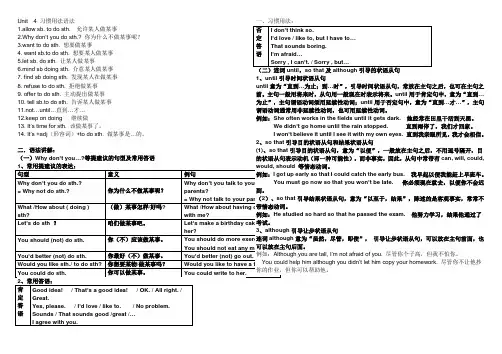

I. 动词原形的用法:1、除单三人称的一般现在时,其它人称作主语,动词用原形。
2、将来时态shall, will, should, would之后用动词原形。
3、祈使句句子开头用动词原形。
4、助动词do, does, did之后用动词原形。
5、情态动词can、could、may, might, have/has to, must, need, dare ,ought to之后用动词原形。
6、使役动词let、make、have 之后用动词原形。
7、感官动词see、watch、notice、hear、feel、find之后用动词原形(说明动作已经结束)。
8、had better 之后用动词原形。
9、why / why not 之后用动词原形。
10、would rather do sth . than do sth .11. prefer to do sth. rather than do sth./ prefer doing sth. to doing sth.12.help sb. do sth.II.动名词的用法:1.介词之后动词要用动名词形式(动词+ing)2.部分动词之后的动词只能用动名词形式:enjoy, finish, practice, mind, spend, dislike, find , keep3.部分短语后省略了介词in:have fun/ problems/ difficulties/ trouble /a good time doingbe busy doing , be worth doing , can’t help doing , feel like doing , do some doing sth.4.下面这些动词既可跟动名词又可跟不定式:like / love / hate doing (doing表示习惯)(to do表示具体的动作)stop doing(表示停止)(doing表示开始做不定式的动作);remember , forget (不定式表示未做;动名词表示已做);try (doing表示试着做;to do表示努力做);go on (doing继续做相同的事to do继续做不同的事) ;begin , start (to do与doing区别不大);need (人作主语用to do ;物作主语用doing表示被动);mean(人作主语用to do表示“打算做”;事/ 物作主语用doing表示“意味着”);5.这些动词既可跟动词原形,又可跟ing形式:see,watch,hear.notice(用原形是指动作结束,ing表示动作正在进行)6.go swimming/cleaning/fishing/skating/skiing….7.No parking/swimming/spitting…..8.do some cleaning/washing/reading…III.动词不定式的用法:1.ask/tell/want/order/teach/wish/would like/invite/encourage sb. to do sth.2.ask/tell/want/order/teach/wish/would like/invite/encourage sb. not to do sth.3.Help...(to) do sth. 4、主系表+ 不定式(to do)5.主系表+for sb + 不定式(to do)6.部分动词既可跟动名词又可跟不定式:(同动名词6)7.疑问词+不定式(to do)可以把复合句变为简单句,(to = 主语+will/would/can)IV.动词单三(动词+s / es)用于第三人称单数作主语的一般现在时态。
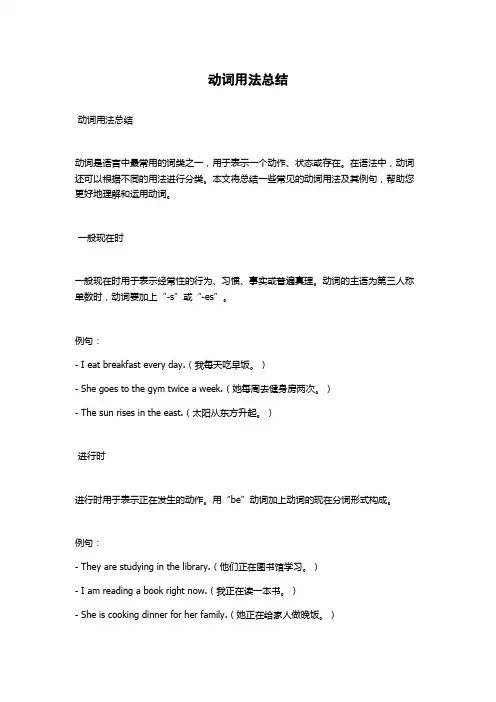
动词用法总结动词用法总结动词是语言中最常用的词类之一,用于表示一个动作、状态或存在。
在语法中,动词还可以根据不同的用法进行分类。
本文将总结一些常见的动词用法及其例句,帮助您更好地理解和运用动词。
一般现在时一般现在时用于表示经常性的行为、习惯、事实或普遍真理。
动词的主语为第三人称单数时,动词要加上“-s”或“-es”。
例句:- I eat breakfast every day.(我每天吃早饭。
)- She goes to the gym twice a week.(她每周去健身房两次。
)- The sun rises in the east.(太阳从东方升起。
)进行时进行时用于表示正在发生的动作。
用“be”动词加上动词的现在分词形式构成。
例句:- They are studying in the library.(他们正在图书馆学习。
)- I am reading a book right now.(我正在读一本书。
)- She is cooking dinner for her family.(她正在给家人做晚饭。
)一般过去时一般过去时用于表示在过去某个特定时间发生或完成的动作。
例句:- I watched a movie last night.(昨晚我看了一场电影。
)- He lived in New York for five years.(他在纽约住了五年。
)- We visited our grandparents during the summer vacation.(在暑假期间,我们去看望了爷爷奶奶。
)完成时完成时用于表示过去某个时间已经发生或完成的动作,强调该动作对当前的影响。
例句:- I have finished my homework.(我已经完成了我的作业。
)- She has visited many countries in her life.(她在一生中已经去过很多国家。
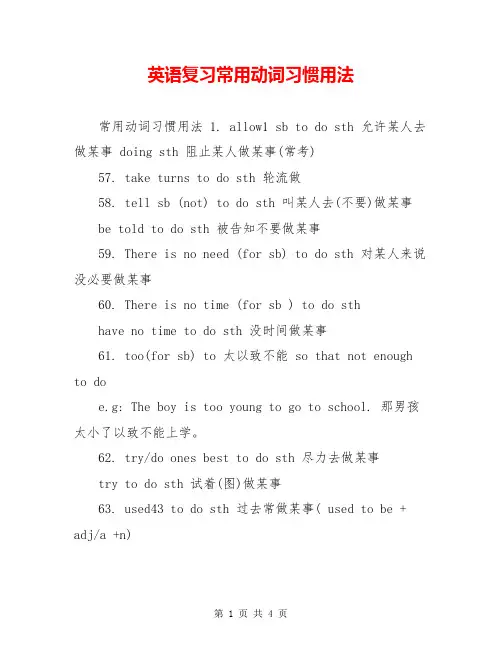
英语复习常用动词习惯用法常用动词习惯用法 1. allow1 sb to do sth 允许某人去做某事 doing sth 阻止某人做某事(常考)57. take turns to do sth 轮流做58. tell sb (not) to do sth 叫某人去(不要)做某事be told to do sth 被告知不要做某事59. There is no need (for sb) to do sth 对某人来说没必要做某事60. There is no time (for sb ) to do sthhave no time to do sth 没时间做某事61. too(for sb) to 太以致不能 so that not enough to doe.g: The boy is too young to go to school. 那男孩太小了以致不能上学。
62. try/do ones best to do sth 尽力去做某事try to do sth 试着(图)做某事63. used43 to do sth 过去常做某事( used to be + adj/a +n)e.g: Mr wang used to be a teacher worker. 王先生过去是一位工人。
I used to live in the country. 过去我住在农村。
64. want/would like to do sth 想做want/would like sb to do sth 想某人做feel like doing sth 喜爱做某事(注意like后接动词ing形式)65. warn44 sb (not) to do sth 警告某人做某事(或不要做某事)66. Why dont you do sthWhy not do sth ( 为什么不(表建议的句型,注意用动词原形) )表示建议的句型还有:What How about(如果是动词,要用ing形式)Shall we67. Would you like (sb) to do sth Yes, Id love to .68. Would you mind doing sth 你介意做某事吗Never mind/Not at all/of course45 not/certainlynot . (从不介意/一点也不介意/当然不会了)69. Would you please (not) do sth 你可不可以不做70. finish doing sth enjoy doing sth practise doing sth be good at doing sth be good at doing sth thank you for doing sth stop doing sth be good at doing sth give up doing sth mind doing sth stop sb from doing sth go on doing sth be busy doing sthsee/hear/watch sb doing sth feel like doing sth hate doing sth like doing sth do well in doing sth be afraid of doing sth be interested in doing sth make a contribution46 to sth/doing sth71. 非延续性动词(终止性动词)1.buy---have(has)had2.borrow---have(has)kept3.leave---have(has)been away4.go ---have(has)been away/ine ---have(has)here/in6.die47 ---have(has)been dead487.join---have(has)been a member of/in8.begin---have(has)on 8.stop---have(has)been overexample: 他的狗死了3天了.: His dog has been dead for three days. It is three days since49 his dogdied50. His dog died three days ago.72. 感官动词:(主动语态不带to)1.hear/see/watch sb do sth 或 2. hear/see/watch sb doing sth1. We often hear him sing the song.2. I saw51 him swimming in the river just now.被动语态带to:1. He is often heard to sing the song.役使动词: (主动语态不带to) make/let sb do sth.His father often makes him do this and that.被动语态带to:He is often made52 to do this and that by his father.。
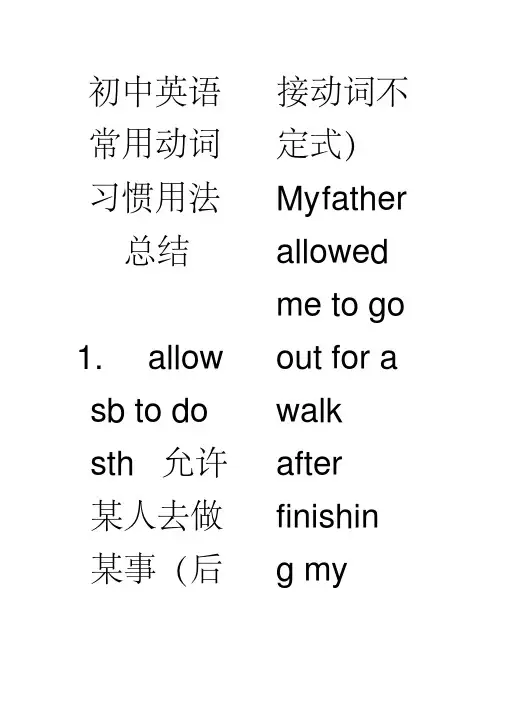
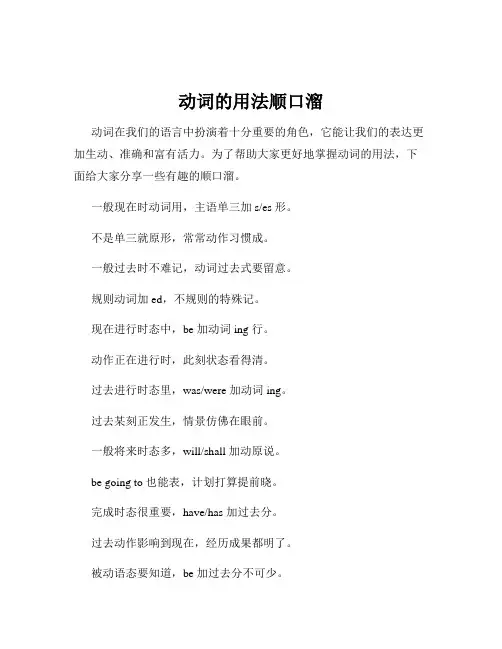
动词的用法顺口溜动词在我们的语言中扮演着十分重要的角色,它能让我们的表达更加生动、准确和富有活力。
为了帮助大家更好地掌握动词的用法,下面给大家分享一些有趣的顺口溜。
一般现在时动词用,主语单三加 s/es 形。
不是单三就原形,常常动作习惯成。
一般过去时不难记,动词过去式要留意。
规则动词加 ed,不规则的特殊记。
现在进行时态中,be 加动词 ing 行。
动作正在进行时,此刻状态看得清。
过去进行时态里,was/were 加动词 ing。
过去某刻正发生,情景仿佛在眼前。
一般将来时态多,will/shall 加动原说。
be going to 也能表,计划打算提前晓。
完成时态很重要,have/has 加过去分。
过去动作影响到现在,经历成果都明了。
被动语态要知道,be 加过去分不可少。
动作承受者为主语,“被”字意思要记牢。
使役动词 let make have,后跟不带 to 不定式。
感官动词 see hear watch,后可跟原形或 doing 式。
动词短语搭配多,介词副词要结合。
break out 爆发起,come out 出版来。
put on 穿上衣,take off 脱下忙。
turn on 打开灯,turn off 关掉光。
look for 寻找物,find 找到心里喜。
give up 放弃难,hold on 坚持易。
比如说,“一般现在时动词用,主语单三加 s/es 形。
不是单三就原形,常常动作习惯成。
”这一句就很好地概括了一般现在时中动词的变化规则。
当主语是第三人称单数时,动词要发生变化,通常是在词尾加 s 或者 es,比如“He likes apples”而当主语不是第三人称单数时,动词就用原形,像“We play football every day”再看“一般过去时不难记,动词过去式要留意。
规则动词加 ed,不规则的特殊记。
”它清晰地指出了一般过去时中动词的形式。
对于规则动词,我们直接在词尾加上 ed,像“walked”“played”;但对于不规则动词,就需要我们特别去记忆,比如“go”的过去式是“went”,“eat”的过去式是“ate”。
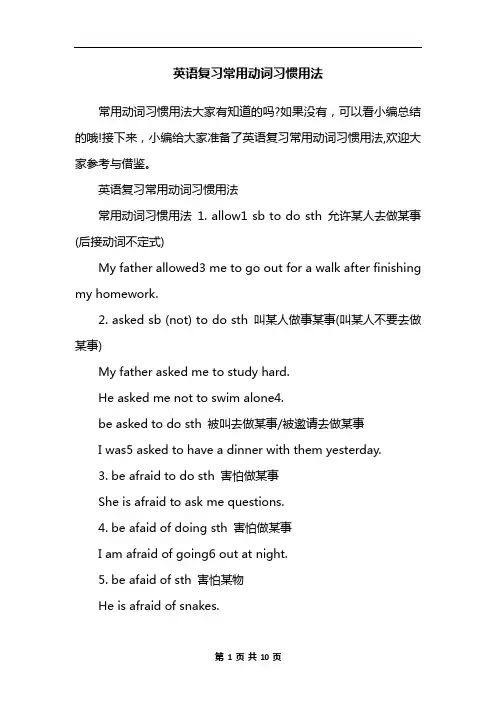
英语复习常用动词习惯用法常用动词习惯用法大家有知道的吗?如果没有,可以看小编总结的哦!接下来,小编给大家准备了英语复习常用动词习惯用法,欢迎大家参考与借鉴。
英语复习常用动词习惯用法常用动词习惯用法1. allow1 sb to do sth 允许某人去做某事(后接动词不定式)My father allowed3 me to go out for a walk after finishing my homework.2. asked sb (not) to do sth 叫某人做事某事(叫某人不要去做某事)My father asked me to study hard.He asked me not to swim alone4.be asked to do sth 被叫去做某事/被邀请去做某事I was5 asked to have a dinner with them yesterday.3. be afraid to do sth 害怕做某事She is afraid to ask me questions.4. be afaid of doing sth 害怕做某事I am afraid of going6 out at night.5. be afaid of sth 害怕某物He is afraid of snakes.6. be amazed7 to do sth 对做某事感到惊讶He was amazed to meet the girl there.be amazed at sth 对某事感到惊讶they were amazed at the news8.7. be busy doing/with sth 忙于做某事(常考)e2.g: I was busy washing9 my car at that time. 那时候我正忙于清洗我的车子。
I am busy with my work.8. be coming/going/leaving/fiying/moving/dying10(某些位移动词用进行时态时表将来)the bus is coming/the dog is dying.9. be excited11 to do sth 对做感到兴奋Jacky was excited to travel12 there by plane.be excited at sthLily13 was excited at his words.be excited about doing sthhe was excited about passing the exam14 without going overing books.10. be frightened15 to do sth 害怕去做某事Sam is frightened to ride a horse.11. be glad/happy to do sth 高兴去做某事she is happy to clean the blackboard with me.be pleased16 to do sth高兴做某事she was pleased to help the old man yesterday.be pleased with sth 对某事感到高兴/满意the teacher was pleased with my answer.12. be interested17 in sth/doing sth 对某事感兴趣/对做某事感兴趣she is interested in swimming in the river.My btother is interested in Chinese.13. be/get ready for/to do sthBe ready for sth 为某事做好了准备We are ready for the exam.Be ready to do sth 为做某事做好了准备We are ready to have a birthday party for her.get ready for sth为某事在做准备We are getting ready for the exam.get ready for sth 为做某事而做准备13. be sorry to do sth 对做某事感到抱歉14. be surprised18 to do sth 对做某事感到惊奇be surprised at sth 对某事感到惊奇15. be worth19 doing sth 值得做某事(worth 后接动词-ing 形式,常考)16. begin to do sthbegin/start to do/doing sth ( 开始去做某事)17. can/be able20 to afford21 (to buy) sth 有能力购买(供)18. can/may/must do sth could/would22/should/might do sth19. cant wait to do sth 迫不急待地去做某事20. decide23 to do sth 决定去做某事make up ones mind24 to do sth 下决心去做某事(常考)make a decision25 to do sth 对做某事作出决定21. deserve26 to do sth 值得/应该做22. encourage27 sb to do sth 鼓励某人去做某事23. enjoy doing sth 乐意去做某事24. expect28 (sb) to do sth 期望去做某事25. fail29 to do sth 做某事失败succeed30 doing sth 成功做了某事26. finish doing sth 做完某事(后接动词-ing形式)(常考)27. follow sb to do sth 跟随某人去做某事28. get sb to do sthmake sb do sthlet sb do sth (让某人做某事(后接动词原形))29. get/have a chance31 to do sth 得到一个做某事的机会30. give/pass/show/lend/sell sb sth/sth to sbbuy/get/bring sb sth/sth for sb31. go on to do sth 继续做事(常考)go on doing sth 继续做事(常考)32. hate32 to do/doing sth 讨厌/不喜欢做某事33. have fun doing sth34. have problems33 doing sth 做某事遇到困难35. have sb do sthhave sth donehave sth to do 工有事要做36. hear sb do sth 听到某人做某事(后接动词原形,常考)hear sb doing sth 听到某人正在做某事(常见)37. help to do sth 帮忙做某事help sb (to) do sth 帮助某人做某事38. hope/wish to do sth 希望做某事wish sb to do sth 希望某人做某事39. I t seems35 that 这像是(后接从句)seem34 to do sthseem +adj40. Its + adj+(for sb) to do sth .Its+adj +(of sb) to do sthe.g: Its glad for him to hear the news.41. It takes sb some time/money to do sth . 花费某人多长时间做某事(常考)42. pay36 for cost37 spendon.. it take to do sth43. Its best for sb to do sth. 对某人来说做某事是最好的had38 better do sth 最好做某事(注意had没有时态和人称的变化,better后接动词原形)44. Its time for sb to do sth 是某人做某事的时候了45. keep (on)doing sth 坚持做某事(常考)keep sb doing sth 让某人做某事(常考)keep sb from doing sth 阻止某人做某事(常考)keep sb/sth +adjkeep the book for 2 days 借这本书两天(不要用borrow或lend)46. learn to do sth 学做某事learn sth from sb 向某人学习47. like to do/doing sth 喜欢做某事like sb to do sth 喜欢某人做某事48. need to do sthneed doing sth/to be doneneed sth neednt do sth(需要做某事)49. prefer39 to do sth rather40 than do sth 宁愿而不愿(常考)prefer doing sth to doing sth 喜欢做胜过做e.g: I prefer reading41 books to going shopping. 比起购物来,我更爱读书。
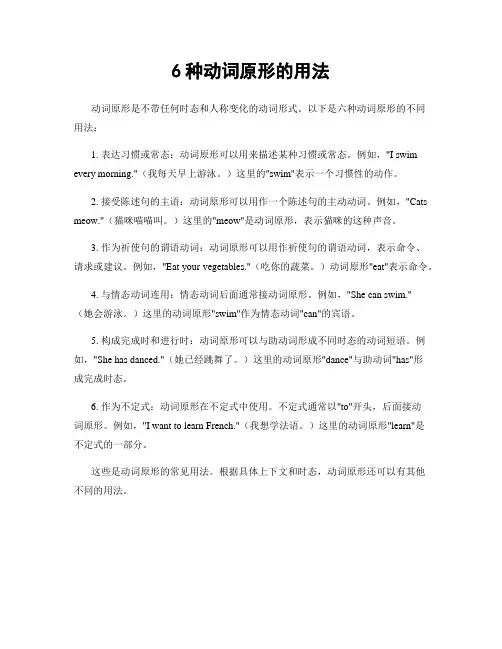
6种动词原形的用法动词原形是不带任何时态和人称变化的动词形式。
以下是六种动词原形的不同用法:1. 表达习惯或常态:动词原形可以用来描述某种习惯或常态。
例如,"I swim every morning."(我每天早上游泳。
)这里的"swim"表示一个习惯性的动作。
2. 接受陈述句的主语:动词原形可以用作一个陈述句的主动动词。
例如,"Cats meow."(猫咪喵喵叫。
)这里的"meow"是动词原形,表示猫咪的这种声音。
3. 作为祈使句的谓语动词:动词原形可以用作祈使句的谓语动词,表示命令、请求或建议。
例如,"Eat your vegetables."(吃你的蔬菜。
)动词原形"eat"表示命令。
4. 与情态动词连用:情态动词后面通常接动词原形。
例如,"She can swim."(她会游泳。
)这里的动词原形"swim"作为情态动词"can"的宾语。
5. 构成完成时和进行时:动词原形可以与助动词形成不同时态的动词短语。
例如,"She has danced."(她已经跳舞了。
)这里的动词原形"dance"与助动词"has"形成完成时态。
6. 作为不定式:动词原形在不定式中使用。
不定式通常以"to"开头,后面接动词原形。
例如,"I want to learn French."(我想学法语。
)这里的动词原形"learn"是不定式的一部分。
这些是动词原形的常见用法。
根据具体上下文和时态,动词原形还可以有其他不同的用法。
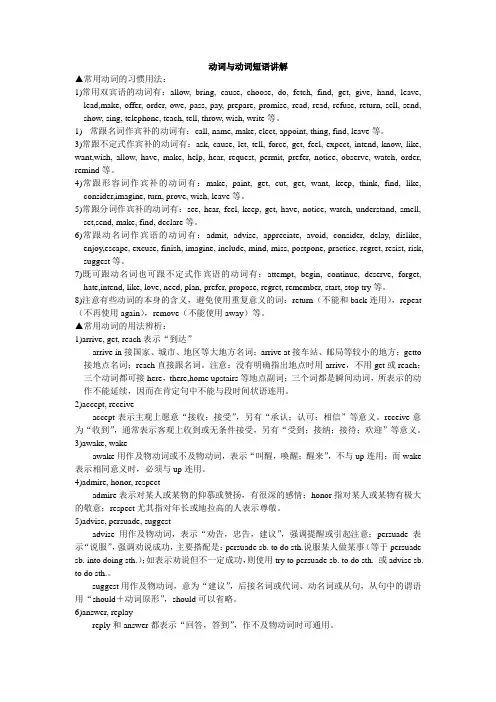
动词与动词短语讲解▲常用动词的习惯用法:1)常用双宾语的动词有:allow, bring, cause, choose, do, fetch, find, get, give, hand, leave, lead,make, offer, order, owe, pass, pay, prepare, promise, read, read, refuse, return, sell, send, show, sing, telephone, teach, tell, throw, wish, write等。
1)常跟名词作宾补的动词有:call, name, make, elect, appoint, thing, find, leave等。
3)常跟不定式作宾补的动词有:ask, cause, let, tell, force, get, feel, expect, intend, know, like, want,wish, allow, have, make, help, hear, request, permit, prefer, notice, observe, watch, order, remind等。
4)常跟形容词作宾补的动词有:make, paint, get, cut, get, want, keep, think, find, like, consider,imagine, turn, prove, wish, leave等。
5)常跟分词作宾补的动词有:see, hear, feel, keep, get, have, notice, watch, understand, smell, set,send, make, find, declare等。
6)常跟动名词作宾语的动词有:admit, advise, appreciate, avoid, consider, delay, dislike, enjoy,escape, excuse, finish, imagine, include, mind, miss, postpone, practice, regret, resist, risk, suggest等。
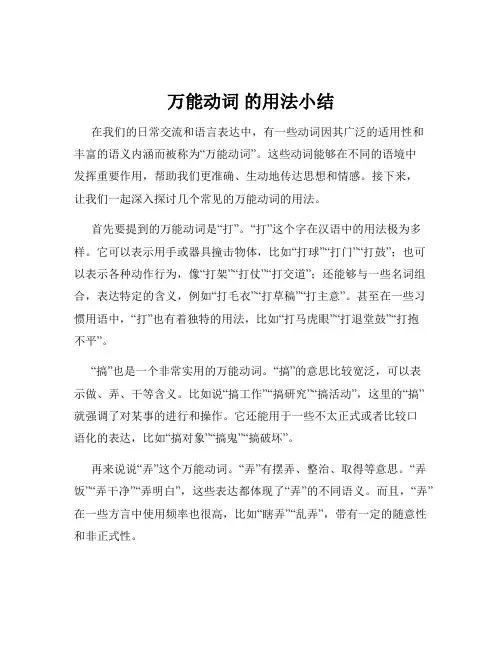
万能动词的用法小结在我们的日常交流和语言表达中,有一些动词因其广泛的适用性和丰富的语义内涵而被称为“万能动词”。
这些动词能够在不同的语境中发挥重要作用,帮助我们更准确、生动地传达思想和情感。
接下来,让我们一起深入探讨几个常见的万能动词的用法。
首先要提到的万能动词是“打”。
“打”这个字在汉语中的用法极为多样。
它可以表示用手或器具撞击物体,比如“打球”“打门”“打鼓”;也可以表示各种动作行为,像“打架”“打仗”“打交道”;还能够与一些名词组合,表达特定的含义,例如“打毛衣”“打草稿”“打主意”。
甚至在一些习惯用语中,“打”也有着独特的用法,比如“打马虎眼”“打退堂鼓”“打抱不平”。
“搞”也是一个非常实用的万能动词。
“搞”的意思比较宽泛,可以表示做、弄、干等含义。
比如说“搞工作”“搞研究”“搞活动”,这里的“搞”就强调了对某事的进行和操作。
它还能用于一些不太正式或者比较口语化的表达,比如“搞对象”“搞鬼”“搞破坏”。
再来说说“弄”这个万能动词。
“弄”有摆弄、整治、取得等意思。
“弄饭”“弄干净”“弄明白”,这些表达都体现了“弄”的不同语义。
而且,“弄”在一些方言中使用频率也很高,比如“瞎弄”“乱弄”,带有一定的随意性和非正式性。
“做”同样是一个使用广泛的万能动词。
“做功课”“做买卖”“做文章”,从学习到商业活动再到文学创作,“做”涵盖了众多领域的行为。
此外,“做”还可以与一些形容词连用,构成一种具有特定意义的表达,比如“做假”“做难”“做绝”。
这些万能动词虽然意义丰富,但在使用时也需要注意一些问题。
首先,要根据具体的语境选择合适的万能动词,以确保表达的准确性和恰当性。
比如,在正式的书面语中,可能“从事”“进行”等词汇会比“搞”“弄”更合适。
其次,要注意万能动词与其他词语的搭配习惯,避免出现搭配不当的错误。
例如,“打主意”可以,但“搞主意”就不太通顺。
另外,不同地区对于这些万能动词的使用偏好和习惯也可能有所不同。
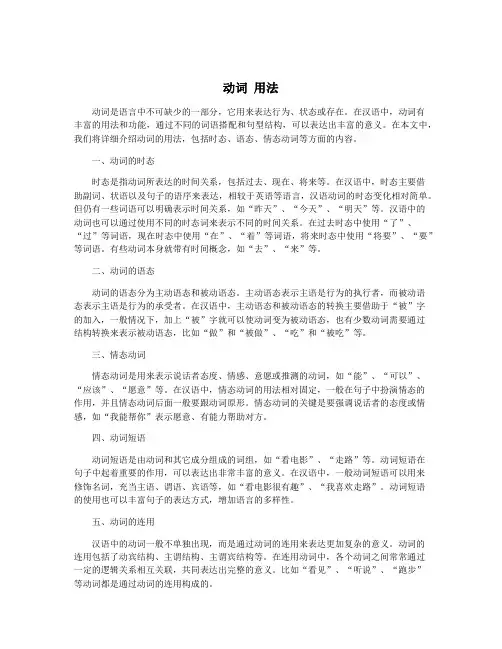
动词用法动词是语言中不可缺少的一部分,它用来表达行为、状态或存在。
在汉语中,动词有丰富的用法和功能,通过不同的词语搭配和句型结构,可以表达出丰富的意义。
在本文中,我们将详细介绍动词的用法,包括时态、语态、情态动词等方面的内容。
一、动词的时态时态是指动词所表达的时间关系,包括过去、现在、将来等。
在汉语中,时态主要借助副词、状语以及句子的语序来表达,相较于英语等语言,汉语动词的时态变化相对简单。
但仍有一些词语可以明确表示时间关系,如“昨天”、“今天”、“明天”等。
汉语中的动词也可以通过使用不同的时态词来表示不同的时间关系。
在过去时态中使用“了”、“过”等词语,现在时态中使用“在”、“着”等词语,将来时态中使用“将要”、“要”等词语。
有些动词本身就带有时间概念,如“去”、“来”等。
二、动词的语态动词的语态分为主动语态和被动语态。
主动语态表示主语是行为的执行者,而被动语态表示主语是行为的承受者。
在汉语中,主动语态和被动语态的转换主要借助于“被”字的加入,一般情况下,加上“被”字就可以使动词变为被动语态,也有少数动词需要通过结构转换来表示被动语态,比如“做”和“被做”、“吃”和“被吃”等。
三、情态动词情态动词是用来表示说话者态度、情感、意愿或推测的动词,如“能”、“可以”、“应该”、“愿意”等。
在汉语中,情态动词的用法相对固定,一般在句子中扮演情态的作用,并且情态动词后面一般要跟动词原形。
情态动词的关键是要强调说话者的态度或情感,如“我能帮你”表示愿意、有能力帮助对方。
四、动词短语动词短语是由动词和其它成分组成的词组,如“看电影”、“走路”等。
动词短语在句子中起着重要的作用,可以表达出非常丰富的意义。
在汉语中,一般动词短语可以用来修饰名词,充当主语、谓语、宾语等,如“看电影很有趣”、“我喜欢走路”。
动词短语的使用也可以丰富句子的表达方式,增加语言的多样性。
五、动词的连用汉语中的动词一般不单独出现,而是通过动词的连用来表达更加复杂的意义。
英语动词习惯用法归类总结1. allow sb to do sth允许某人去做某事allow doingsth.允许做某事be allowed to do sth.被允许做某事should be allowed to do sth.应该被允许做某事2. ask sb (not) to do sth叫某人做某事(叫某人不要去做某事)be asked todo sth 被叫去做某事/被邀请去做某事3. be afraid to do sth 害怕做某事be afaid ofdoing sth 害怕做某事be afaid of sth 害怕某物4. be amazed to do sth对做某事感至『惊讶be amazedat sth对某事感至『惊讶5. be busy doing/with sth 忙于做某事6. be coming/going/leaving/fiying/moving(某些位移动词用进行时态表将来)7. be excited to do sth对做••感到兴奋be excited atsth对…感到兴奋be excited aboutdoing sth8. be frightened to do sth 害怕去做某事9. be glad/happy to do sth 高兴去做某事be pleasedto do sth 高兴做某事be pleased with sth 对某事感至高兴/满意10. be interested in sth/doing sth 对某事感兴趣/对做某事感兴趣11. be ready for sth 为某事做好了准备be ready todo sth 为做某事做好了准备get ready for sth 为某事在做准备12. be sorry to do sth 对做某事感至抱歉13. be surprised to do sth对做某事感到惊奇be surprisedat sth对某事感到惊奇14. be worth doing sth 值得做某事(worth 后接动词-ing 形式)15. can/be able to afford (to buy) sth 有能力购买(供)…16. can/may/must do sthcould /might /would/should/ do sth17. can ' t wait to do s迫不急待地去做某事18. complain( to sb) about sth(向某人)抱怨某事19. decide to do sth 决定去做某事decide on doingsth.make up one ' s mind to dosth 下决心去做某事make a decision to do sth对做某事作出决定20. deserve to do sth值得/应该做…21. e ncourage sb to do sth鼓励某人去做某事22. enjoy doing sth乐意去做某事23. expect (sb) to do sth 期望去做某事24. fail to do sth 做某事失败succeed in doingsth成功做了某事25. finish doing sth做完某事(后接动词-ing形式)26. follow sb to do sth跟随某人去做某事27. let sb do sth /make sb do sth /get sb to do sth让某人做某事28. get/have a cha nee to do sth得到一个做某事的机会29. give/pass/show/lend/sell sb sth/sth to sbbuy/get/bring sb sth/sthfor sb30. go on to do sth 继续做(另一件)事go on doingsth 继续做(同一件)事31. hate to do/doing sth 讨厌/不喜欢做某事32. have fun doing sth33. have trouble/problems doing sth 做某事遇到困难34. have sb do sth让某人做某事have sth done让某事被做have sth to do有事要做35. hear sb do sth听到某人做某事(后接动词原形)hear sb doingsth听到某人正在做某事36. .help (to) do sth帮忙做某事help sb (to) dosth帮助某人做某事37. hope/wish to do sth 希望做某事wish sb to dosth 希望某人做某事38」t seems that 这像是. 后接从句)seem to do sthseem +adj39.It 's + adj+(for sb) to do sth .It 's+adj +(of sb)to do sth40.It takes sb some time/money to do sth .花费某人多长时间做某事41.pay …for, ・cost, spend •…on •厂it take •…to do sth42.It ' s best for sb to do对t某人来说做某事是最好的had better(not) do sth 最好(不)做某事(注意had 没有时态和人称的变化, better 后接动词原形)43.It ' s time for sb to do是某人做某事的时候了44.keep (on)doing sth 坚持做某事keep sb doingsth让某人做某事keep sb from doing sth 阻止某人做某事keep sb/sth +adjkeep the book for 2 days 借这本书两天(不要用borrow 或lend)45.learn to do sth 学做某事learn sth from sb 向某人学习46.like to do/doing sth 喜欢做某事like sb to do sth 喜欢某人做某事47. something to eat/drink 一些吃/喝的东西48. spend some time (in)doing sth /on sth 花费时间做某事spend somemoneyon sth/doing sth 买 .. 花了多少钱49. sth is hard/difficult/easy to do .做好某事很难/容易50. .stop to do sth 停下来去做某事(另一件事)stop doing sth 停止做某事stop/keep/prevent sb from doingsth 阻止某人做某事51. suggest doi ng sth 建议做某事52. succeed in doi ng sth 成功做某事53. take turns to do sth 轮流做...54. tell sb (not) to do sth 叫某人去(不要)做某事be told to dosth 被告知不要做某事55. There is no need (for sb) to do sth对某人来说没必要做某事56. There is no time (for sb ) to do sthhave no time todo sth 没时间做某事57. too…(for sb) to do sth太…以致不能做某事58. try/do one ' s best to d尽s力去做某事try to do sth 努力做某事try doing sth 尝试做某事59. used to do sth 过去常做某事60. want/would like to do sth 想做... want/would like sb todo sth想某人做... feel like doing st喜爱做某事(注意like后接动词ing形式)61. warn sb (not) to do sth 警告某人做某事(或不要做某事)62. Would you like (sb) to do sth ?Yes, I ' d love to .63. Would you mind doing sth ?你介意做某事吗?Never mind/Notat all/of course not/certainly not .64. Would you please (not) do sth你可不可以(不)做.. ?65. finish doing sthenjoy doing sthpractice doing sthbegood at doing sthstop doing sththank you for doing sthbe good atdoing sthgive up doing sthmind doing sthstop sb fromdoing sthgo on doing sthbe busy doing sthfeel like doing sthhate doing sthlike doing sthdo well in doing sthbe afraid ofdoing sthbe interested in doing sthsee/hear/watch sbdoing sthmake a contribution to sth/doing sth。
第八章常用动词习惯用法及句型一、常用动词习惯用法。
1、allow sb to do sth 允许某人去做某事(后接动词不定式)allow doing sth 允许做某事(动词-ing形式)2、asked sb (not) to do sth 叫某人做事某事(叫某人不要去做某事)be asked to do sth 被叫去做某事3、be afraid to do sth 害怕做某事4、be afaid of doing sth 害怕做某事5、be amazed to do sth 对做某事感到惊讶be amazed at sth 对做某事感到惊讶6、be busy doing/with sth 忙于做某事(常考)例如:I was busy washing my car at that time. 那时候我正忙于清洗我的车子。
7、be coming/ going/ leaving/ flying/ moving (某些位移动词用进行时态时表将来)8、be excited to do sth 对做……感到兴奋be excited at sthbe excited about doing sth9、be frightened to do sth 害怕去做某事10、be glad/happy to do sth 高兴去做某事be pleased to do sth = be pleased with sth 对某事感到高兴11、be interested in sth/doing sth 对某事感兴趣/对做某事感兴趣12、be ready to do sth = get ready to do sth13、be sorry to do sth 对做某事感到抱歉14、be surprised to do sth 对做某事感到惊奇be surprised at sth 对某事感到惊奇15、be worth doing sth 值得做某事(worth 后接动词-ing形式,常考)16、begin to do sthbegin/start to do/doing sth17、can/be able to afford (to buy) sth 有能力购买(供)……18、can/may/must do sth could/would/should/might do sth19、can’t wait to do sth 迫不急待地去做某事20、decide to do sth 决定去做某事make up one’s mind to do sth 下决心去做某事(常考)make a decision to do sth 对做某事作出决定21、deserve to do sth 值得/应该做……22、encourage sb to do sth 鼓励某人去做某事23、enjoy doing sth 乐意去做某事24、expect (sb) to do sth 期望去做某事25、fail to do sth 做某事失败succeed doing sth 成功做了某事26、finish doing sth 做完某事(后接动词-ing形式)(常考)27、follow sb to do sth 跟随某人去做某事28、get sb to do sth = make sb do sth = let sb do sth29、get/have a chance to do sth 得到一个做某事的机会30、give/pass/show/lend/sell sb sth/ sth to sbbuy/get/bring sb sth/ sth for sb31、go on to do sth 继续做事(常考)go on doing sth 继续做事(常考)32、hate to do/doing sth 讨厌/不喜欢做某事33、have fun doing sth34、have problems doing sth 做某事遇到困难35、have sb do sthhave sth donehave sth to do 工有事要做36、hear sb do sth 听到某人做某事(后接动词原形,常考)hear sb doing sth 听到某人正在做某事(常见)37、help to do sth 帮忙做某事help sb (to) do sth 帮助某人做某事38、hope/wish to do sth 希望做某事wish sb to do sth 希望某人做某事39、I t seems that 这像是……(后接从句)seem to do sthseem +adj40、It’s + adj+(for sb) to do sth .It’s+ adj +(of sb) to do sth例如:It’s glad for him to hear the news.41、It takes sb some time to do sth . 花费某人多长时间做某事(常考)42、It’s best for sb to do sth. 对某人来说做某事是最好的had better do sth 最好做某事(注意had没有时态和人称的变化,better后接动词原形)43、It’s time for sb to do sth 是某人做某事的时候了44、keep (on)doing sth 坚持做某事(常考)keep sb doing sth 让某人做某事(常考)keep sb from doing sth 阻止某人做某事(常考)keep sb/sth +adjkeep the book for 2 days 借这本书两天(不要用borrow或lend)45、learn to do sth 学做某事learn sth from sb 向某人学习46、like to do/doing sth 喜欢做某事like sb to do sth 喜欢某人做某事47、need to do sthneed doing sth/to be doneneed do sth48、prefer to do sth rather than do sth 宁愿……而不愿……(常考)prefer doing sth to doing sth 喜欢做……胜过做……例如:I prefer reading books to going shopping. 比起购物来,我更爱读书。
动词用法总结动词是表示人或物的动作、状态或存在的词语。
在句子中,动词通常起着谓语的作用,用于表示动作的发生、进行或状态的存在。
动词根据不同的时态、语态、语气等形式变化,具有多种用法。
下面对动词的一些常见用法进行总结。
1. 表示动作的进行或完成:动词可以用来表示具体的动作,比如run(跑)、eat(吃)等。
动词的进行形式用于表示动作正在进行,比如am/is/are running(正在跑)、am/is/are eating(正在吃)等。
动词的完成形式用于表示动作已经完成,比如have/has run(已经跑过)、have/has eaten(已经吃过)等。
2. 表示状态的存在:动词还可以用来表示某种状态的存在,比如be(是/在)、live(生活)等。
动词be有多种形式,用于表示不同的时态和人称,例如am/is/are(一般现在时)、was/were(一般过去时)等。
3. 表示愿望、意愿或请求:有些动词可以用来表示愿望、意愿或请求,比如want(想要)、hope(希望)、wish(希望)、ask(请求)等。
这些动词通常与不定式搭配使用,例如wantto go(想要去)、hope to see(希望见到)等。
4. 表示能力、可能性或允许:有些动词可以表示能力、可能性或允许,比如can(能够)、may/might(可能)、allow(允许)等。
这些动词通常与动词原形搭配使用,例如can swim (会游泳)、may rain(可能下雨)等。
5. 表示习惯、例行或经验:有些动词可以表示习惯、例行或经验,比如usually(通常)、often(经常)、always(总是)等。
这些动词通常与一般现在时连用,表示经常或反复发生的动作,例如I usually go to the gym in the morning(我通常早上去健身房)。
6. 表示想象、虚拟或条件:有些动词可以表示想象、虚拟或条件,比如imagine(想象)、suppose(假设)、if(如果)等。
词语搭配学习常用的动词搭配和习惯用语动词搭配和习惯用语是语言中的重要组成部分,它们的正确运用可以使我们的表达更加准确、流畅。
在学习和运用这些词语搭配时,我们需要掌握它们的具体用法和语境。
本文将介绍一些常用的动词搭配和习惯用语,并提供一些例句来帮助读者理解和记忆。
一、动词搭配1. Make an effort to意为“努力做某事”,用于表示努力去完成某项任务或目标。
例句:We should make an effort to reduce waste and protect the environment.(我们应该努力减少浪费,保护环境。
)2. Take into account/consideration意为“考虑到”,用于表示在做决定或采取行动时考虑某个因素或情况。
例句:When choosing a career, you should take into account your interests and abilities.(选择职业时,你应该考虑到自己的兴趣和能力。
)3. Pay attention to意为“注意”,用于表示关注某个事物或情况。
例句:We should pay attention to the quality of products when shopping online.(购物时,我们应该关注产品的质量。
)4. Have an impact on意为“对...有影响”,用于表示某个事物对另一个事物产生影响。
例句:Smoking has a negative impact on people's health.(吸烟对人们的健康有负面影响。
)5. Take advantage of意为“利用”,用于表示好好利用某个机会或资源。
例句:You should take advantage of your free time to learn something new.(你应该利用空闲时间学习一些新东西。
常用动词习惯用法1. allow sb to do sth 允许某人去做某事(后接动词不定式My father allowed me to go out for a walk after I finished my homework.2. asked sb (not to do sth 要求某人做某事/要求某人不要做某事My father asked me to study hard.He asked me not to swim alone.be asked to do sth 被要求去做某事/被邀请去做某事I was asked to have dinner with them yesterday.3. be afraid to do sth 害怕做某事She is afraid to ask me questions.4. be afaid of doing sth 害怕做某事I am afraid of going out at night.5. be afaid of sth 害怕某物He is afraid of snakes.6. be frightened to do sth 害怕做某事Sam is frightened to ride a horse.7. be angry with sb 对某人生气be angry at sth 对某事生气8. be amazed to do sth 对做某事感到惊讶He was amazed to meet the girl there.be amazed at sth 对某事感到惊讶They were amazed at the news.9. be busy doing sth 忙于做某事be busy with sth 忙于某事e.g: I was busy washing my car at that time. 那时候我正忙于清洗我的车子。
I am busy with my work.10. be coming/going/leaving/flying/moving/dying(某些位移动词用进行时态时表将来I’m leaving at 5 o’clock tomorrow afternoo n.The bus is coming. 车就要来了。
The dog is dying. 这条狗快要死了。
11. 对做…感到兴奋be excited to do sthbe excited about doing sthJacky was excited to travel there by plane.he was excited about passing the exam without going overing books.be excited at sth 对……感到兴奋Lily was excited at his words.12. be glad/happy to do sth 高兴做某事she is happy to clean the blackboard with me.be pleased to do sth高兴做某事she was pleased to help the old man yesterday.be pleased with sth 对某事感到高兴/满意the teacher was pleased with my answer.13. be interested in sth/doing sth 对某事感兴趣/对做某事感兴趣she is interested in swimming in the river.My btother is interested in Chinese.13. be/get ready for/to do sthbe ready for sth 为某事做好了准备We are ready for the exam.be ready to do sth 为做某事做好了准备We are ready to have a birthday party for her.get ready for sth为某事在做准备We are getting ready for the exam.get ready to do sth 为做某事而做准备14. be sorry to do sth 对做某事感到抱歉be sorry for sth 对……感到抱歉I’m sorry for what I said yesterday.15. be surprised to do sth 对做某事感到惊奇be surprised at sth 对某事感到惊奇16. be worth doing sth 值得做某事(worth 后接动词-ing形式 be well worth doing sth 非常值得做某事be worthy of doing sth 值得做某事17. 开始做某事begin/start to dobegin/start doing sth18. 能做某事can do sthbe able to do sthcan/could afford (to buy/pay sth有能力购买(支付……19. can/may/must do sthcould/would/should/might do sth20. can’t wait to do sth 迫不急待地去做某事can’t help doing sth 情不自禁做某事I can't wait to go with you.She could’t help crying.21. decide to do sth 决定去做某事make a decision to do sth (decision是decide的名词形式make up one’s mind to do sth 下决心去做某事22. deserve to do sth 值得/应该做……deserve sth 值得……You’ve been working all m orning—you deserve a rest.= You’ve been working all morning—you deserve to have a rest.23. encourage sb to do sth 鼓励某人去做某事24. enjoy doing sth 喜欢去做某事25. expect to do sth 期望去做某事expect sb to do sth 期望某人去做某事希望去做某事hope to dowish to dowish sb to do sth希望某人去做某事(Note:没有hope sb to do 26. fail to do sth 做某事失败succeed in doing sth 成功做了某事27. finish doing sth 做完某事(后接动词-ing形式28. follow sb to do sth 跟随某人去做某事29. 让某人做某事(后接动词原形get sb to do sthmake sb do sthlet sb do sthhave sb do sthNote: make. Have后面跟省略to的不定式,但在被动语态中应把to加回来。
Eg: Mother made me do the housework.I was made to do the housework.30. get/have a chance to do sth 得到一个做某事的机会31. give/pass/show/lend/sell sb sth 给/递/给……看/借出/卖……给某人give/pass/show/lend/sell sth to sbbuy/get/bring sth for sb 为某人……买/得到/带来某物buy/get/bring sb sth32. go on to do sth 继续做另外一件事go on doing sth 继续做原来的事33. stop to do sth 停下来做另外一件事stop doing sth 停下原来的事34. hate to do/doing sth 讨厌/不喜欢做某事35. have fun doing sth 做……玩得愉快36. have some(no problems/difficulty/trouble doing sth 做某事有(没有困难I have some difficulty learning English.37. 让某人做某事(后接动词原形have sb do sthhave sth done 让……被做I have my hair cut yesterday.我昨天理了发。
have something/nothing to do with sb 与某人有/无关38. hear sb do sth 听到某人做某事(后接动词原形,hear sb doing sth 听到某人正在做某事(后接动词-ing形式see/watch sb do sth 看到某人做某事see/watch sb doing sth 看到某人正在做某事be seen/heard to do sth 做某事被看见/听见(Note:被动语态时,不定式的to要加回来,同make和have39. help to do sth 帮忙做某事help sb (to do sth 帮助某人做某事40. It seems that 好像/似乎……(后接从句seem to do sthseem (to be+adj/n.I seem to have lost my keys. 我觉得好像丢了钥匙。
She seems happy today.He seems to be there.The baby seems to be asleep.41. It’s + adj+(for sb to do sth . (句中应选择important, necessary,difficult,hard,easy等形容词It’s+adj +(of sb to do sth. (句中应选择nice, kind, friendly, strong等形容人的品格等的形容词e.g: It’s important for him to hear the news.= To hear the news is important for him.It’s very nice of you to send me flowers.= You are very nice to send me flowers42. pay (sb money for s th…为某物付(某人钱sth cost sb money 某物花费某人….. 钱sb spend money on sth….. 某人花费….. 钱在某物上sb spend time (in doing sth 某人花费…..时间做某事it took/takes/will take sb time to do sth 做某事花费某人多长时间43. It’s best for sb to do sth. 对某人来说做某事是最好的had better do sth 最好做某事(Note: 这里had没有时态和人称的变化,better后接动词原形44. It’s time for sb to do sth 该到时间做某事了45. keep (ondoing sth 坚持做某事keep sb doing sth 让某人一直做某事keep sb from doing sthprevent sb from doing sth 阻止某人做某事stop sb (from doing sthkeep +adj 保持…..keep sth +adj 保持某物…..keep the book for 2 days 借这本书两天(不要用短暂性动词borrow或lend 46. learn to do sth 学习做某事learn sth from sb 向某人学习某事47. need to do sth 需要做某事need doing sth=need to be done 某物需要被……The clothes need washing.= The clothes need to be washed. 这衣服需要洗了。